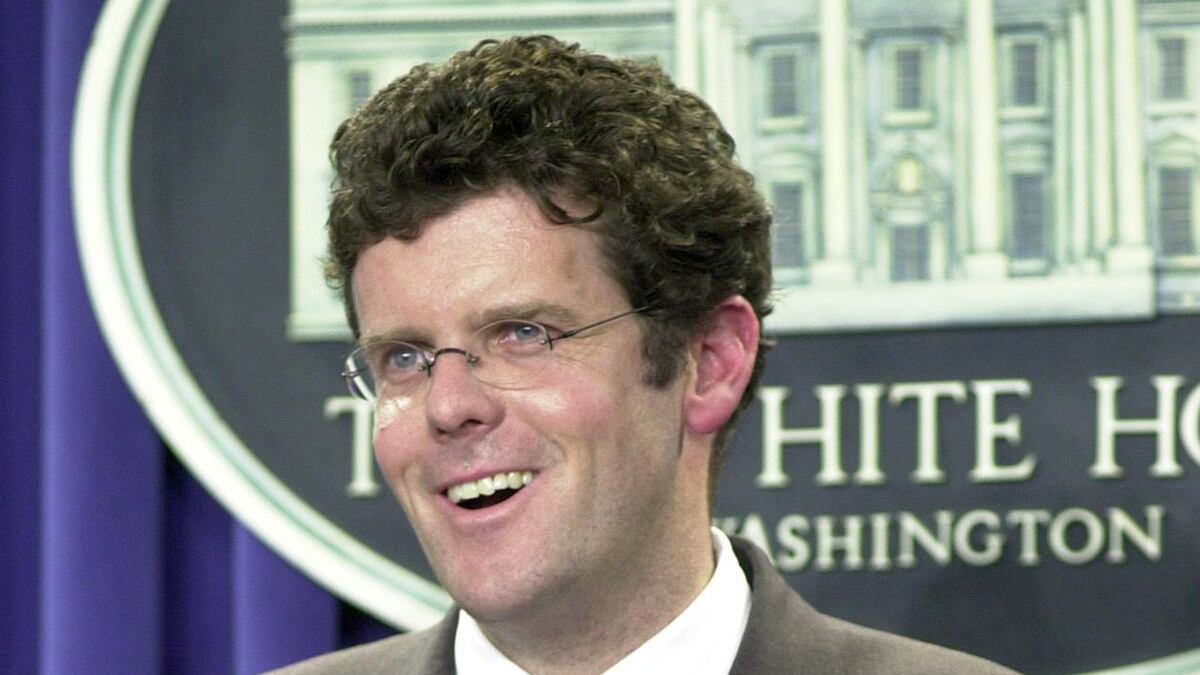For Goldman Sachs, the much-reviled investment bank that has become a pop-culture synonym for government bailouts and wanton greed, Greg Smith’s bombshell resignation letter was yet another PR catastrophe.
But for Jake Siewert, Goldman’s newly installed global head of corporate communications, it was just another walk in the park.
The 48-year-old Siewert’s second day on the job Wednesday was graced by the New York Times’ publication of Smith’s letter, in which a departing executive director from Goldman’s European derivatives business accused the firm’s leaders of fostering a “toxic and destructive” culture that abuses the trust of loyal clients—derisively nicknamed “muppets”—and celebrates avarice above all.
The letter ignited a stink bomb on Wall Street and provoked oodles of controversy and commentary in the media. Goldman’s shares lost more than $2 billion in equity as Smith’s indictment percolated through the trading floor of the New York Stock Exchange.
Siewert, whose wife, Christine, is expecting their third baby any minute, joked to his new colleagues: “After my first week here, I’m looking forward to the peace and quiet of the delivery room.”
According to a Goldman Sachs insider, he played a minimal role in the content of the investment bank’s defensive, self-justifying official response to Smith’s broadside, signed by chief executive Lloyd Blankfein and chief operating officer Gary Cohn, but was among those who argued that it be released very quickly, in time for the next news cycle. (Siewert declined to comment for this story.) But this latest PR crisis is child’s play compared to Siewert’s previous experience working for President Bill Clinton.

“He knows from the ups and downs of scandal,” said Dee Dee Myers, the first Clinton White House press secretary—a job that Siewert was the last person to hold. “This isn’t his first time at the rodeo,” Myers added, “and if there’s anybody who’s well positioned to see the blazing trees in the foreground and go what’s beyond it to see the whole forest, it’s Jake. He knows something about taking the long view and hanging in there.”
A second close White House colleague, who asked not to be identified, echoed Myers’s view. “There is no doubt that having lived through and managed a few media frenzies in politics helps navigate one of these in the private sector,” this person told The Daily Beast. “The skills are the same, and Goldman Sachs is lucky to have him there.”
Democratic political consultant Mike Feldman, another friend from the Clinton administration, recalled attending Siewert’s final White House briefing, which was supposed to have been fond farewell with the regulars in the press corps, after which they’d planned a celebratory lunch. Instead, it devolved into a grim exchange over Clinton’s sudden agreement to give up his law license, and pay $25,000 fine to the Arkansas bar, in order to avoid prosecution by the independent counsel for giving misleading testimony about his relationship with Monica Lewinsky.
“It was insane,” Feldman said. “And it was sort of incredible how even-keeled he was.”
The next day, as Clinton prepared to relinquish the presidency to George W. Bush, was even worse, as public outrage exploded over Clinton’s presidential pardons, especially his last-minute pardon of fugitive financier Marc Rich. With typical sangfroid, Siewert laughingly said “Good luck with that!” as he handed off his government-issued cell phone to Julia Payne, Clinton’s post-presidency spokesperson, and then went on a long-planned skiing vacation in Jackson Hole, Wyo. “Let’s just say,” Feldman added, “that Jake has some perspective.”
Siewert’s challenge will be to orchestrate the rebranding of Goldman Sachs, from a den of self-interested greedheads to a public-spirited profit machine powering the economy, and help repair its tattered reputation that was damaged in the financial meltdown of 2008. “He’s going to have to appeal to different audiences,” said Payne. “There’s a public audience, a political audience, the clients, your shareholders, and he’s going to need to reach out to each to them in very targeted ways.”
If he’s successful, Goldman Sachs will start making far less news in the political sphere—headlines usually being a bad thing—and consumers of business news will find themselves reading less about the 142-year-old financial house’s personalities and drama than about its deals and investments.
Siewert, who is being rewarded with a seven-figure compensation package, brings a wealth of experience in the public and private sectors. After toiling in the 1992 Clinton campaign and eight years in the White House, where he started out as a spokesman for the National Economic Council, he ran communications for Alcoa (the corporate home of George W. Bush’s first Treasury secretary, Paul O’Neill) and later signed on as a top adviser to Tim Geithner, President Obama’s Treasury secretary.
He is stylistically on a different planet from his Goldman Sachs predecessor, Lucas van Praag, a waspishly elegant Brit who gained fame among the financial press for his wittily abusive putdowns of their criticisms of the investment bank. Siewert certainly can be a combative partisan, and doesn’t hesitate to use lethal force (as I learned as a gossip columnist for The Washington Post), but he masks his aggression in a self-deprecating, everyman persona. “He doesn’t get ruffled,” said another Clinton intimate, “and he has a kind of low-key master-of-the-universe vibe. And he understands that to do the job well, you serve your clients—your bosses, be it the president or the partners—by making sure the people covering him don’t feel they’re being lied to.”
Feldman agreed, arguing that Siewert’s instinctive understanding of reporters and their needs will perhaps be his most valuable asset. “Having served at the highest levels of the public and private sectors, in terms of dealing with the media, he has an incredible understanding of how journalists do their jobs, and what they need,” Feldman said. “If he were parroting back talking points to you, you wouldn’t find that useful. Jake understands that transaction.”






